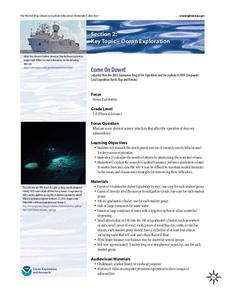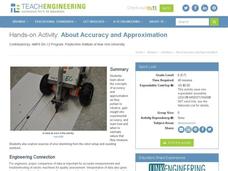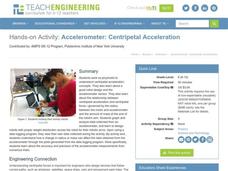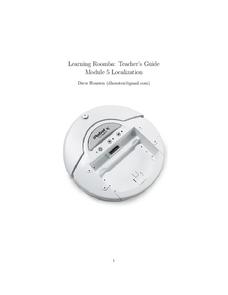NOAA
Come on Down!
What do we do when a dive is too dangerous for humans to accomplish? Send in the robots! Middle school scientists get acquainted with several different models of submersible robots in the second lesson of six from NOAA. Lab groups then...
NOAA
Biological Oceanographic Investigations – Call to Arms
How many simple machines does it take to make a robotic arm? An inquiry-based lesson explores that topic and challenges pupils to build a robotic arm that can stretch, turn, and more. A few questions help guide them in the right...
A Mighty Girl
Cynthia Breazeal
MIT Professor Cynthia Breazeal is a pioneer in the field of social robotics. Introduce your classes to this amazing woman with a colorful poster that details some of her many accomplishments.
Chesterfield Township Elementary School
Gifted and Talented Enrichment Curriculum
Looking to start or support a Gifted and Talented program? An 80-page packet outlines grade-leveled lessons in all subject areas as school district's Gifted and Talented enrichment curriculum.
College Board
Strategies for Teaching AP Computer Science
Implement strategies from the beginning to the end. A collection of strategies and lessons span from the first day of school to after the exam. Resources cover basic information such as computer ethics and top 10 tips to a instructional...
Tutorials Point
Artificial Intelligence
You needn't take a stress pill or don a space helmet to take a tutorial in artificial intelligence. In fact, HAL might recommend the course with great enthusiasm and confidence for those seeking an introduction to AI.
DiscoverE
Coding Without Computers
See what it feels like to be a robot. Scholars use programming vocabulary to program a human robot and test out their codes by acting them out. The code should result in stacking six cups into a pyramid.
Teach Engineering
About Accuracy and Approximation
How accurate are robots? Groups draw lines by moving robots backwards and forwards by one rotation of the wheels. Using the appropriate formula, they determine the percent error in the length of the lines in relation to the calculated...
Teach Engineering
Accelerometer: Centripetal Acceleration
Scholars build robotic arms that swing back and forth and use them to collect velocity and acceleration data. To analyze the results, pupils compare data to the equations for angular velocity and centripetal acceleration.
PBS
Robo Arm
Future engineers create robotic arms like those on rovers built by NASA in the second lesson of the series. They test their devices by attempting to pick up and move cups to a specified location.
Drexel University
Learning Roomba Module 4: Sensors and Actuators
Introduce your classes to sensors and actuators in robots — specifically to the Roomba. Pupils develop programs that make Roomba utilize its different sensors.
Drexel University
Learning Roomba Module 3: Controlling Movement
Look at it go. The resource, the third in a series of five using a Roomba, explains the different types of movements a Roomba makes, then challenges pupils to create computer codes that will cause the Roomba to travel specific paths.
Drexel University
Learning Roomba Module 2: Robot Configurations
How do robots move? A presentation shows viewers the different types of configurations of that help robots move and lists the advantages and disadvantages of each of the configurations.
Drexel University
Learning Roomba Module 1: Robotics Introduction
Introducing Mr. Robot. As an introduction to robotics, class develop a definition of a robot and make distinctions between real robots and those in science fiction. They also study the basics of programming in Java to program a Roomba.
Drexel University
Learning Roomba Module 5: Localization
Where is my robot? Pupils create programs that utilize the localization services that a Roomba uses to determine its surroundings.
IMAX
Hubble
Explore what it takes to service the Hubble telescope. In the set of three activities, groups investigate several aspects of the Hubble telescope, including robotic arms used during repairs, spacesuits, and extravehicular activity (EVA)...
Teach Engineering
Automatic Floor Cleaner Computer Program Challenge
Have your class use the engineering design process to program a vacuum robot. Using computer engineering concepts, teams program an automatic floor cleaner to traverse designated patterns.
Teach Engineering
Designing a Robotic Surgical Device
The engineering design process meets laparoscopic surgical robots with an activity that is the last part in a series of 10 and brings all the lessons of the unit together. Teams design and build a remotely controlled laparoscopic device....
Teach Engineering
Strong-Arm Tactics
Experience collecting rock samples using a robotic arm with an activity that has pairs work together to operate a robotic arm. One pupil serves as the eyes and the other operates the controller. The objective is to be the fastest pair to...
Teach Engineering
Red Rover Robotics
Help your class understand the importance of exploration using robots. with a resource that provides a short history of robotics as a lead into looking at Martian robotic exploration missions. The activity specifically looks at the...
Computer Science Unplugged
Conversations with Computers—The Turing Test
Will the real computer please stand up? The premise of this activity is for the class to ask questions to a human and to a computer and to determine which is which. The class asks a given set of questions, and the person playing the role...
Teach Engineering
The Fibonacci Sequence and Robots
What better way to introduce the idea of a sequence than with robots! An educational lesson explains the classic Fibonacci sequence before pupils build and program a robot to move. Additionally, the lesson challenges individuals to...
Curated OER
Up for the Challenge?
A general engineering quiz can be given at the beginning of your engineering or technology unit to stimulate interest. A wide variety of topics are touched by engineers, including the medical industry, energy production, building design,...
Curated OER
The Roving Robotic Chemist
Junior oceanographers and underwater geologists describe the four major steps of mass spectrometry. They compete in small groups to simulate the tracking of a deepwater methane plume using imaginary autonomous underwater vehicles. Give...

























